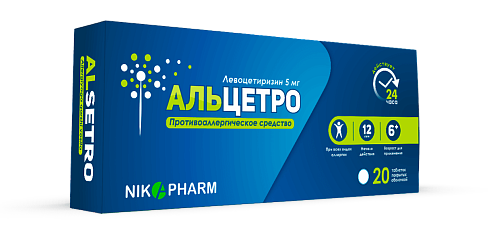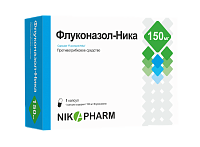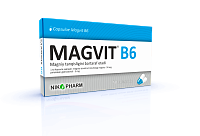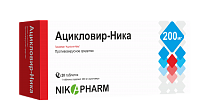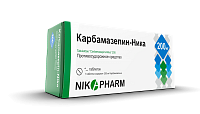Indications
Symptomatic therapy of allergic diseases and conditions:- Year-round (persistent) and seasonal (intermittent) allergic rhinitis and allergic conjunctivitis (itching, sneezing, rhinorrhea, lacrimation, conjunctival hyperemia, nasal congestion);
- pollinosis (hay fever);
- urticaria (including chronic idiopathic urticaria);
- Quincke's edema;
- other allergic dermatoses accompanied by itching and rashes.
How to use and dosage
Film-coated tablets are taken orally, swallowing whole, with meals or on an empty stomach, drinking a small amount of water.Adults and children over 6 years of age: the daily dose is 5 mg (1 tablet) once daily.
Since levocetirizine is excreted by kidneys, when using the drug in patients with renal insufficiency and elderly patients the dose should be adjusted depending on the CK value.
CK can be calculated based on serum creatinine concentration using the following formula:
- For men: CK (mL/min) = [140-age (years)] × body weight (kg)/72 × serum creatinine (mg/dL);
- for women: CK (mL/min) = [140-age (years)] × body weight (kg)/72 × serum creatinine (mg/dL) × 0.85.
Patients with mild renal impairment (creatinine clearance 50-79 mL/min) do not require dose adjustment.
In patients with moderate renal impairment (creatinine clearance 30 to 49 mL/min), the recommended dose is 5 mg every other day.
In patients with severe renal impairment (creatinine clearance less than 30 ml/min) the recommended dose is 5 mg once every 3 days.
Patients in the terminal stage (patients on hemodialysis, creatinine clearance less than 10 ml/min) administration of the drug is contraindicated.
Patients with renal and hepatic insufficiency are dosed according to the above scheme.
Patients with impaired hepatic function only do not require dosage regimen correction.
Duration of use depends on the indications.
In treatment of seasonal (intermittent) rhinitis (presence of symptoms less than 4 days a week or their total duration less than 4 weeks) duration of treatment depends on duration of symptomatology; treatment can be stopped at disappearance of symptoms and resumed at appearance of symptoms.
In the treatment of year-round (persistent) allergic rhinitis (symptoms more than 4 days per week and a total duration of more than 4 weeks), treatment may be continued for the duration of allergen exposure.
In chronic diseases (year-round rhinitis, atopic dermatitis) the duration of treatment may be increased up to 18 months.
If you forget to take ALCETRO® do not take a double dose to compensate for a missed dose, take the next dose at the usual time.
